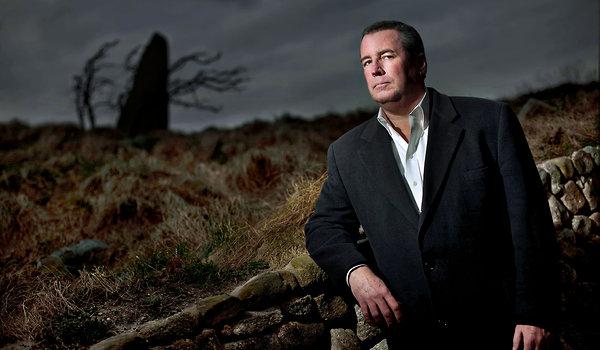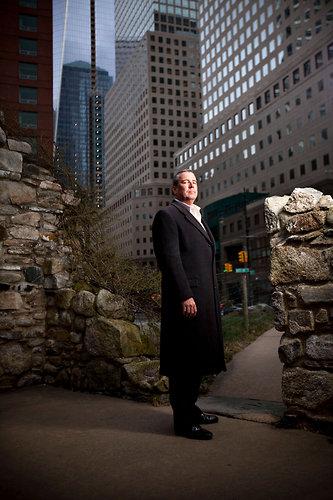Men Struggle for Rape Awareness
By Roni Caryn Rabin
Keith Smith was 14 when he was raped by a driver who picked him up after a hockey team meeting. He had hitchhiked home, which is why, for decades, he continued to blame himself for the assault. When the driver barreled past Hartley's Pork Pies on the outskirts of Providence, R.I., where Mr. Smith had asked to be dropped off, and then past a firehouse, he knew something was wrong. "I tried to open the car door, but he had rigged the lock," said Mr. Smith, of East Windsor, N.J., now 52. Still, he said, "I had no idea it was going to be a sexual assault." Even today, years after the disclosure of the still-unfolding child abuse scandal in the Catholic Church and the arrest of a former Pennsylvania State University assistant football coach accused of sexually abusing boys, rape is widely thought of as a crime against women. Until just a few weeks ago, when the federal government expanded its definition of rape to include a wider range of sexual assaults, national crime statistics on rape included only assaults against women and girls committed by men under a narrow set of circumstances. Now they will also include male victims. While most experts agree women are raped far more often than men, 1.4 percent of men in a recent national survey said they had been raped at some point. The study, by the Centers for Disease Control and Prevention, found that when rape was defined as oral or anal penetration, one in 71 men said they had been raped or had been the target of attempted rape, usually by a man they knew. (The study did not include men in prison.) And one in 21 said they had been forced to penetrate an acquaintance or a partner, usually a woman; had been the victim of an attempt to force penetration; or had been made to receive oral sex. Other estimates have run even higher. A Department of Justice report found that 3 percent of men, or one in 33, had been raped. Some experts believe that one in six men have experienced unwanted sexual contact of some kind as minors. But for many men, the subject is so discomfiting that it is rarely discussed — virtually taboo, experts say, because of societal notions about masculinity and the idea that men are invulnerable and can take care of themselves. "We have a cultural blind spot about this," said David Lisak, a clinical psychologist who has done research on interpersonal violence and sexual abuse and is a founding board member of 1in6, an organization that offers information and services to men who had unwanted or abusive sexual experiences as children. "We recognize that male children are being abused," Dr. Lisak said, "but then when boys cross some kind of threshold somewhere in adolescence and become what we perceive to be men, we no longer want to think about it in this way." Even when high-profile cases dominate the news, said Mai Fernandez, executive director of the National Center for Victims of Crime advocacy organization in Washington, "attention goes to the things we feel more comfortable talking about — such as whether Penn State had done enough, and what will happen to their football program — and not to the question, 'What do we do to prevent boys from being sexually assaulted?' " In an interview with The Washington Post this month, Joe Paterno, the Penn State football coach who was fired after the abuse scandal erupted and who died of lung cancer on Sunday, said that when an assistant had told him about witnessing an inappropriate encounter between a young boy and Jerry Sandusky, the former assistant coach who is facing charges of sexual abuse, he had been confused and unsure how to proceed. Mr. Paterno said the assistant "didn't want to get specific. And to be frank with you, I don't know that it would have done any good, because I never heard of, of rape and a man." Much of the research on the sexual assault of men has focused on prisons. But men are also raped outside of prison, usually by people they know, including acquaintances and intimate partners, but occasionally by complete strangers. They are raped as part of violent, drunken or drug-induced assaults; war crimes; interrogations; antigay bias crimes; and hazing rites for male clubs and organizations, like fraternities, and in the military. In one study of 3,337 military veterans applying for disability benefits for post-traumatic stress disorder, 6.5 percent of male combat veterans and 16.5 percent of noncombat veterans reported either in-service or post-service sexual assault. (The rates were far higher for female veterans, 69.0 percent and 86.6 percent respectively.) A Pentagon report released on Thursday found a 64 percent increase in sexual crimes in the Army since 2006, with rape, sexual assault and forcible sodomy the most frequent violent sex crimes committed last year; 95 percent of all victims were women. Some studies have reported that the risk of rape is greatest for men who are young, are living in poverty or homeless, or are disabled or mentally ill. The C.D.C. study found that one-quarter of men who had been raped were assaulted before they were 10 , usually by someone they knew. And young men raised by poor single mothers are especially vulnerable to male predators, said Dr. Zane Gates, an internist who cares for low-income patients on Medicaid at a community health center in Altoona, Pa. "You're looking for a male figure in your life desperately, and you'll give anything for that," he said. Eugene Porter, a therapist in Oakland, Calif., and the author of the book "Treating the Young Male Victim of Sexual Assault," said that while some assailants seek power and dominance, others "find that aggression enhances their sexual experience." "There is no arena in which rape takes place between men and women that it does not take place between men and men," he said. Like women, men who are raped feel violated and ashamed and may become severely depressed or suicidal. They are at increased risk for substance abuse, problems with interpersonal relationships, physical impairments, chronic pain, insomnia and other health problems. But men also face a challenge to their sense of masculinity. Many feel they should have done more to fight off their attackers. Since they may believe that men are never raped, they may feel isolated and reluctant to confide in anyone. Male rape victims may become confused about their sexual orientation or, if gay and raped by a man, blame their sexual orientation for the rape. "If you're sexually assaulted, there's this idea that you're no longer a man," said Neil Irvin, executive director of the organization Men Can Stop Rape. "The violence is ignored, and your sexual orientation and gender are confronted." Many rape crisis centers — which often also provide services for victims of domestic violence — do not have the resources to counsel male victims. Remarkably few male victims seek professional help for injuries, screening for sexually transmitted diseases or counseling after an attack, often waiting years or decades. One study of 705 men in Virginia found that 91, or 13 percent, had been sexually assaulted, a vast majority of them before they turned 18. Fewer than one-fifth of victims had ever received professional services related to the assault. "Men are affected — they have high rates of P.T.S.D. and depression — but the majority don't get help," said Dr. Saba W. Masho, the lead author of the Virginia study and an associate professor of epidemiology and community health at Virginia Commonwealth University. "It's easy for you and I to talk about it, but when you put yourself in that victim's shoes, they're asking, 'Do I want people to know? How do I seek help? Do I want my doctor to know? Where do I go?' " Mr. Smith told his older brother and father about what had happened as soon as he got home, and the three went to the police to file a report. Mr. Smith had memorized the license plate number of the car, and the owner, who was known to the police because of a conviction for distributing pornography, was arrested. He was killed on the streets of Providence before he could stand trial. Today, Mr. Smith is a member of the speakers bureau for Rainn, the Rape, Abuse and Incest National Network, which provides online counseling for victims. For years, he said, he suffered from nightmares in which he was fleeing his assailant's car, scared that the man, who had handed him $10 and dropped him off almost three hours after picking him up, was coming back. "I was waking up screaming," he said.
|
.
Any original material on these pages is copyright © BishopAccountability.org 2004. Reproduce freely with attribution.

